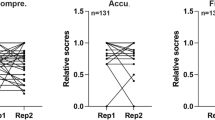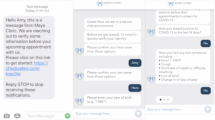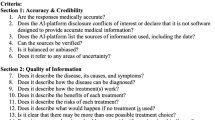Abstract
Purpose
This study assessed the performance of LLM-linked chatbots in providing accurate advice for colorectal cancer screening to both clinicians and patients.
Methods
We created standardized prompts for nine patient cases varying by age and family history to query ChatGPT, Bing Chat, Google Bard, and Claude 2 for screening recommendations to clinicians. Chatbots were asked to specify which screening test was indicated and the frequency of interval screening. Separately, the chatbots were queried with lay terminology for screening advice to patients. Clinician and patient advice was compared to guidelines from the United States Preventive Services Task Force (USPSTF), Canadian Cancer Society (CCS), and the U.S. Multi-Society Task Force (USMSTF) on Colorectal Cancer.
Results
Based on USPSTF criteria, clinician advice aligned with 3/4 (75.0%), 2/4 (50.0%), 3/4 (75.0%), and 1/4 (25.0%) cases for ChatGPT, Bing Chat, Google Bard, and Claude 2, respectively. With CCS criteria, clinician advice corresponded to 2/4 (50.0%), 2/4 (50.0%), 2/4 (50.0%), and 1/4 (25.0%) cases for ChatGPT, Bing Chat, and Google Bard, respectively. For USMSTF guidelines, clinician advice aligned with 7/9 (77.8%), 5/9 (55.6%), 6/9 (66.7%), and 3/9 (33.3%) cases for ChatGPT, Bing Chat, Google Bard, and Claude 2, respectively. Discordant advice was given to clinicians and patients for 2/9 (22.2%), 3/9 (33.3%), 2/9 (22.2%), and 3/9 (33.3%) cases for ChatGPT, Bing Chat, Google Bard, and Claude 2, respectively. Clinical advice provided by the chatbots stemmed from a range of sources including the American Cancer Society (ACS), USPSTF, USMSTF, and the CCS.
Conclusion
LLM-linked chatbots provide colorectal cancer screening recommendations with inconsistent accuracy for both patients and clinicians. Clinicians must educate patients on the pitfalls of using these platforms for health advice.
Similar content being viewed by others
Data availability
Not applicable.
Code availability
Not applicable.
References
Thirunavukarasu AJ, Ting DSJ, Elangovan K, Gutierrez L, Tan TF, Ting DSW. Large language models in medicine. Nat Med. 2023;29:1930–40.
Bhattacharya K, Bhattacharya AS, Bhattacharya N, Yagnik VD, Garg P, Kumar S. ChatGPT in Surgical Practice—a New Kid on the Block. Indian J Surg. 2023. https://doi.org/10.1007/s12262-023-03727-x.
Rudolph J, Tan S, Tan S. War of the chatbots: Bard, Bing Chat, ChatGPT, Ernie and beyond. The new AI gold rush and its impact on higher education. JALT. 2023. https://doi.org/10.37074/jalt.2023.6.1.23.
Ferdush J, Begum M, Hossain ST. ChatGPT and clinical decision support: scope, application, and limitations. Ann Biomed Eng. 2023. https://doi.org/10.1007/s10439-023-03329-4.
Rahsepar AA, Tavakoli N, Kim GHJ, Hassani C, Abtin F, Bedayat A. How AI responds to common lung Cancer questions: ChatGPT vs Google Bard. Radiology. 2023;307:e230922.
Ayers JW, Leas EC, Dredze M, Allem JP, Grabowski JG, Hill L. Clinicians’ perceptions of barriers to avoiding Inappropriate Imaging for LowBack Pain— Knowing is not enough. JAMA Intern Med. 2016;176:1865–6.
Xie Y, Seth I, Hunter-Smith DJ, Rozen WM, Ross R, Lee M. Aesthetic surgery advice and counseling from Artificial Intelligence: a Rhinoplasty Consultation with ChatGPT. Aesthetic Plast Surg. 2023;47:1985–93.
Haver HL, Ambinder EB, Bahl M, Oluyemi ET, Jeudy J, Yi PH. Appropriateness of breast Cancer Prevention and Screening recommendations provided by ChatGPT. Radiology. 2023;307:e230424.
Fu S, Wang L, Moon S, Zong N, He H, Pejaver V, et al. Recommended practices and ethical considerations for natural language processing-assisted observational research: a scoping review. Clin Transl Sci. 2023;16:398–411.
Kalyta A, De Vera MA, Peacock S, Telford JJ, Brown CJ, Donnellan F, et al. Canadian colorectal cancer screening guidelines: do they need an update given changing incidence and global practice patterns? Curr Oncol. 2021;28:1558–70.
Wolf AMD, Fontham ETH, Church TR, Flowers CR, Guerra CE, LaMonte SJ, et al. Colorectal cancer screening for average-risk adults: 2018 guideline update from the American Cancer Society. CA Cancer J Clin. 2018;68:250–81.
Davidson KW, Barry MJ, Mangione CM, Cabana M, Caughey AB, Davis EM, et al. Screening for Colorectal Cancer: US Preventive Services Task Force Recommendation Statement. JAMA. 2021;325:1965–77.
Rex DK, Boland CR, Dominitz JA, Giardiello FM, Johnson DA, Kaltenbach T, et al. Colorectal Cancer screening: recommendations for Physicians and patients from the U.S. Multi-society Task Force on Colorectal Cancer. Am J Gastroenterol. 2017;112:1016–30.
Bacchus C, Dunfield L, Gorber S, Holmes N, Birtwhistle R, Dickinson J, et al. Recommendations on screening for colorectal cancer in primary care. Can Med Assoc J. 2016;188:340–8.
Acknowledgements
Not applicable.
Funding
This study was unfunded.
Author information
Authors and Affiliations
Contributions
All authors contributed to the study conception and design. SA, JM, HA, VB, KR, and CE provided expert guidance on the study methodology. Material preparation, data collection and analysis were performed by BH, TM, MO, and Yung Lee. The first draft of the manuscript was written by Bright Huo and all authors commented on previous versions of the manuscript. All authors read and approved the final manuscript.
Corresponding author
Ethics declarations
Ethical approval
Not applicable.
Consent to participate
Not applicable.
Conflicts of interest
The authors have no relevant financial or non-financial interests to disclose.
Additional information
Publisher’s Note
Springer Nature remains neutral with regard to jurisdictional claims in published maps and institutional affiliations.
Electronic supplementary material
Below is the link to the electronic supplementary material.
Rights and permissions
Springer Nature or its licensor (e.g. a society or other partner) holds exclusive rights to this article under a publishing agreement with the author(s) or other rightsholder(s); author self-archiving of the accepted manuscript version of this article is solely governed by the terms of such publishing agreement and applicable law.
About this article
Cite this article
Huo, B., McKechnie, T., Ortenzi, M. et al. Dr. GPT will see you now: the ability of large language model-linked chatbots to provide colorectal cancer screening recommendations. Health Technol. 14, 463–469 (2024). https://doi.org/10.1007/s12553-024-00836-9
Received:
Accepted:
Published:
Issue Date:
DOI: https://doi.org/10.1007/s12553-024-00836-9




